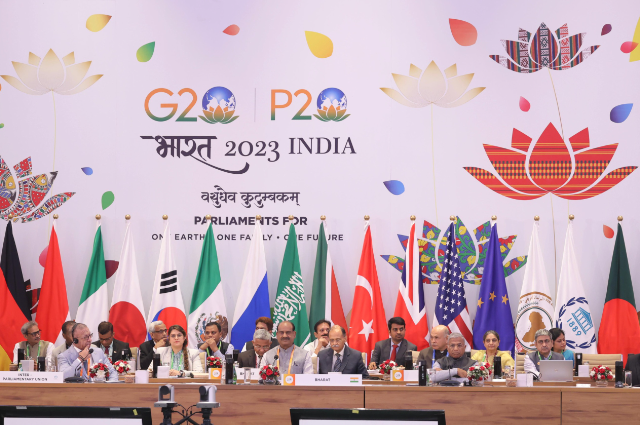“Economic equality is the master key to nonviolent independence.”- Mahatma Gandhi
The seeds of globalization were sowed back in the early 18th century to accelerate trade and promote economic growth. However, on the flip side, globalization widened latent disparities cutting across financial, social, and cultural institutions. Gini Index is an indicator to assess income inequality. A critical analysis of the Gini Index from 1990-2015 highlights that the disparity has widened in leading economies. For instance, the Gini Index in the United States increased from 38.24 to 41.5 & in India; it increased from 29.7 to 35.15 from 1990 to 2015. The intertwined world has made it impossible for a single nation to eradicate inequality with mere fiscal and monetary policies. Coordination among countries is quintessential to bridge the social and economic divide.
To achieve sustainable growth and emphasize ensuring equity, 19 nations comprising almost two-thirds of the population constituted a premium forum, G20.
G20 plays a critical role in promoting policies fostering equality. Even the ongoing G20 summit, under the chairmanship of Prime Minister Shri Narendra Modi, is centred around the theme of "Vasudhaiva Kutumbakam”, which emphasizes inclusive growth. Under the chairmanship of Narendra Modi, G2O witnessed the addition of the African Union, a bloc whose representation is quintessential in ensuring economic and social equality.
A Microscopic Look
The initiatives undertaken by G20 to eradicate inequality can be broadly categorized as follows.
- Promotion of local entrepreneurship: SME Finance Forum estimates a credit shortfall close to $2.6 trillion. Access to capital restrains income-generating opportunities. The 2015 summit concluded with forming a Joint Action Plan on SME Financing & the Investment and Infrastructure Working Group (IIWG). The joint groups eased SME financing policies and explored opportunities to expand SME outreach in non-member nations. The groups worked on three frontiers – i) Robust credit framework, ii) Loans against movable collaterals, and iii) Bankruptcy norms.
- Employment opportunities: ILO reports an employed population of 2.2 billion in 2022, with a gender gap of 25 percentage points in G20 economies. Even though the absolute number of employed has increased over the years, there has been little decline in the gender gap. G20 has demonstrated its sheer commitment to reducing the gender gap by 25% by 2025. G20 economies have formed G20 and formulated the G20 Skill Strategy & a framework for improving job quality. G20, in collaboration with the ILO, are constantly reviewing the skilling landscape and assisting underdeveloped nations in their HRD policies.
- Food security: The United Nations reports that over 720 million people are afflicted by hunger. Despite significant improvements in crop production methods, the statistic is concerning. G20 economies produce 80% of the world's cereals, which amplifies the ubiquity of G20 on food security and nutrition issues. For instance, the 2014 FSN framework proposed responsible aggrotech investment and enhancing employment opportunities in the farming sector.
- Social inequalities: Independent research estimates that around 71% of the world population is subjected to inequalities of various intensities and criticality. G20 leaders have been making consistent efforts to address multiple discriminatory issues. For instance, the 2017 declaration attributed 14% of the text to gender equality.
India’s commitment amidst COVID-19: A case in point
As India hosts the G20 2023 summit, it is imperative to look at India's unwavering commitment to ensuring access to vaccines for everyone amidst's trying times of COVID-19. The limited supply of vaccines posed questions to the sanity of the vaccination program as vaccine discrimination was bound to prevail. However, India firmly believed in providing equal health opportunities to underdeveloped nations. India, also known as the 'pharmacy of the world,' chose to adhere to the "Neighborhood first policy" by either gifting or selling more than 20 million vaccine doses to neighbouring countries like Bhutan, Bangladesh, and Nepal. A few developed G20 nations, like the U.S., Japan and Australia, assisted India in supplying 1 billion vaccines in South Asia.
A case in point illustrates that the response of G20 nations is critical to determining world order, especially during testing times like the pandemic.
Way Ahead
The potential of the reforms that G20 can pilot is still untapped and enormous. G20 can explore pooling financial, human, intellectual, and social resources to eradicate inequality in its true spirit. G20 can actively involve civil societies and NGOs to voice the deprived section. G20 can also explore going beyond the target-setting narrative and form independent committees to assess and evaluate the progress of initiatives targeted towards disparity.
G20 has legitimatized an engagement group, Civil 20 (C20), that harmonizes the interests of civil societies, governments, and communities. C20 acts as an informal feedback system, ensuring that society's interests are not subdued by crony capitalism. For instance, during the 2018 Buenos Aires summit, the Japanese provided the participation of non-G20 members from the South.
However, C20 still needs to lay out a charter for operationalizing inequality as an agenda for discussion. A particular group for discussing vertical and horizontal disparities worldwide can be formed under C20, which sets the tone for the G20 summit.
While borders do not constrain particular gender inequality, other inequalities like caste and tribe are sure to the subcontinent. The 2023 C20 in India investigated the disparities in the Indian Subcontinent. G20 is the most influential intergovernmental forum and should explore working in tandem with the ILO, IMF, and other organizations in its fight against inequality.
Under Shri Narendra Modi's chairmanship, who is vocal about SDG goals, the 2023 G20 summit took multiple proactive steps to curb inequality. As we move ahead, the G20 should not become a forum to materialize the hegemonic interests of the powerful nations. G20 must make consistent efforts to broaden & deepen its involvement in public welfare issues.
. . .
REFERENCES:
- Alluri, A.India's Covid vaccine shortage: The desperate wait gets longer. BBC News. https://www.bbc.com/news.
- G20 and low-income developing countries framework - OECD. OECD. (n.d.). https://www.oecd.org/g20
- India Discrimination Report 2022 - D1ns4ht6ytuzzo.net. (n.d.). https://d1ns4ht6ytuzzo.cloudfront.net

